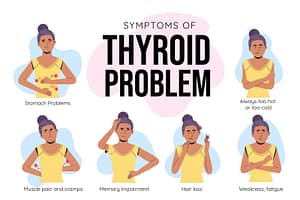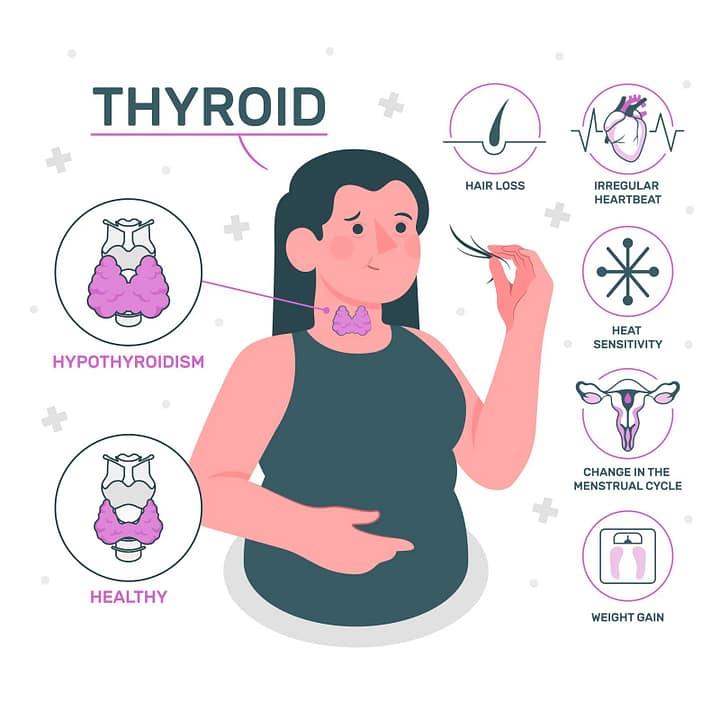Sagegamer
EVERYTHING FOR YOU
Unraveling the Mystery of Thyroid Symptoms in Females: Understanding, Managing, and Reducing Risks
The thyroid gland, a small butterfly-shaped organ located in the neck, plays a crucial role in regulating various bodily functions. From metabolism to energy levels, it influences a myriad of processes in the body. However, when this delicate balance is disrupted, it can lead to a range of symptoms and health complications, particularly in females. In this comprehensive guide, we’ll delve into the intricacies of thyroid health, explore common symptoms, identify factors that increase the risk of thyroid symptoms in female , and offer strategies for management and prevention.
Understanding the Thyroid Gland:
Before delving into thyroid symptoms in female and risk factors, it’s essential to grasp the fundamentals of the thyroid gland. This gland produces hormones—triiodothyronine (T3) and thyroxine (T4)—that regulate metabolism, heart rate, body temperature, and other vital functions. Thyroid-stimulating hormone (TSH), released by the pituitary gland, controls the production of T3 and T4. Any imbalance in this feedback loop can disrupt thyroid function, leading to health issues.


Common Thyroid Symptoms in Females:
Thyroid disorders often manifest through a variety of thyroid symptoms in female, many of which can be subtle and easily overlooked. Some common signs of thyroid dysfunction in females include:
- Fatigue: Thyroid hormones play a crucial role in regulating metabolism and energy production. When thyroid function is impaired, it can lead to persistent tiredness and a feeling of lethargy, even after getting adequate rest. This fatigue may interfere with daily activities and significantly impact quality of life.
- Weight Changes: Thyroid hormones influence metabolism and energy expenditure. When thyroid function is disrupted. It can result in unexplained weight changes, such as sudden weight gain. Difficulty losing weight despite efforts to maintain a healthy diet and exercise routine. Changes in appetite may also accompany these weight fluctuations.
- Mood Swings: Thyroid hormones affect neurotransmitter activity in the brain, which can influence mood regulation. Imbalances in thyroid hormones may lead to mood disturbances, including depression, anxiety, irritability, and sudden mood swings. These emotional changes can significantly impact mental well-being and interpersonal relationships.
- Hair and Skin Changes: Thyroid hormones play a role in regulating skin and hair growth and maintenance. When thyroid function is impaired, it can result in thinning hair, dry and itchy skin, brittle nails, and hair loss. These changes in appearance can affect self-esteem and confidence.
- Menstrual Irregularities: Thyroid hormones can influence the menstrual cycle and reproductive health in females. Disruptions in thyroid function may lead to irregular menstrual cycles, including heavy or light periods, or even the cessation of menstruation (amenorrhea). These menstrual irregularities can affect fertility and overall reproductive health.
- Temperature Sensitivity: Thyroid hormones help regulate body temperature and heat production. When thyroid function is disrupted, it can lead to temperature sensitivity, causing individuals to feel excessively cold or hot, regardless of environmental conditions. This sensitivity to temperature fluctuations can be uncomfortable and impact daily comfort levels.
- Muscle and Joint Pain: Thyroid hormones play a role in maintaining muscle strength and integrity. When thyroid function is impaired, it can lead to muscle weakness, aches, pains, and stiffness in muscles and joints. These symptoms may affect mobility and physical activity levels.
- Digestive Issues: Thyroid hormones influence gastrointestinal motility and digestive processes. When thyroid function is disrupted, it can lead to digestive issues such as constipation, bloating, and other gastrointestinal disturbances. These symptoms can impact nutrient absorption and overall digestive health.
- Heart Palpitations: Thyroid hormones affect heart rate and cardiovascular function. Imbalances in thyroid hormones can lead to rapid or irregular heartbeat, palpitations, or chest discomfort. These heart-related symptoms may increase the risk of cardiovascular complications if left untreated.
Factors Increasing Thyroid Risks in Females:
1. Hormonal Changes:
- Pregnancy, Childbirth, and Menopause: During pregnancy and childbirth, hormonal fluctuations can put strain on the thyroid gland, leading to temporary thyroid dysfunction known as gestational thyroid disorders. Similarly, menopause, characterized by changes in hormone levels, can also impact thyroid function. Hormonal contraceptives, including birth control pills, can influence thyroid hormone levels and thyroid function in some women.
2. Autoimmune Conditions:
- Hashimoto’s Thyroiditis: This autoimmune condition occurs when the body’s immune system mistakenly attacks the thyroid gland, leading to inflammation and gradual destruction of thyroid tissue. Hashimoto’s thyroiditis is more common in females, particularly during middle age, and can result in hypothyroidism.
- Graves’ Disease: Another autoimmune disorder, Graves’ disease, causes the thyroid gland to become overactive, resulting in excessive production of thyroid hormones (hyperthyroidism). Like Hashimoto’s thyroiditis, Graves’ disease is more prevalent in females and can lead to a range of symptoms, including weight loss, palpitations, and eye problems.
3. Genetics:
- A family history of thyroid disorders, including Hashimoto’s thyroiditis, Graves’ disease, or other thyroid conditions, can increase an individual’s susceptibility to developing similar conditions. Genetic predisposition plays a significant role in the likelihood of thyroid dysfunction, and individuals with affected relatives should be vigilant about monitoring their thyroid health.
4. Iodine Deficiency:
- Iodine is a vital nutrient required for the production of thyroid hormones. Inadequate intake of iodine through the diet can lead to iodine deficiency, impairing thyroid hormone synthesis and function. While iodine deficiency is less common in regions with sufficient dietary iodine intake, it remains a significant concern in certain parts of the world. Pregnant and lactating women are particularly vulnerable to iodine deficiency due to increased iodine requirements during these periods.
5. Stress:
- Chronic stress can have far-reaching effects on the body, including disrupting hormonal balance and affecting thyroid function. Stress triggers the release of cortisol and other stress hormones, which can interfere with the production and regulation of thyroid hormones. Prolonged stress may contribute to the development or exacerbation of thyroid disorders, highlighting the importance of stress management techniques for maintaining thyroid health.
6. Environmental Factors:
- Exposure to environmental toxins, such as pollutants, heavy metals, pesticides, and endocrine-disrupting chemicals, can impact thyroid health. These toxins may interfere with thyroid hormone synthesis, secretion, or metabolism, leading to thyroid dysfunction. Additionally, certain medications and industrial chemicals may have thyroid-disrupting effects, posing a risk to thyroid health, particularly in susceptible individuals.
Conclusion to these factors
Understanding these risk factors can help individuals identify potential triggers or predisposing factors for thyroid disorders and take proactive steps to mitigate risks. Maintaining a healthy lifestyle, managing stress effectively, and seeking regular medical evaluation can help promote thyroid health and prevent or manage thyroid-related complications. If experiencing symptoms suggestive of thyroid dysfunction or at risk due to these factors, consulting with a healthcare provider is crucial for proper diagnosis and management.

Managing and Reducing Thyroid Risks:
While some risk factors like genetics cannot change thyroid symptoms in female, there are steps females can take to manage thyroid health and reduce risks:
1. Nutrition:
- Maintain a balanced diet rich in nutrients essential for thyroid function, including iodine, selenium, zinc, and vitamins B and D. Incorporate iodine-rich foods like seaweed, fish, seafood, dairy products, and iodized salt into your diet. Ensure adequate intake of selenium from sources such as Brazil nuts, seafood, and organ meats, as well as zinc from foods like lean meats, nuts, seeds, and whole grains. Consuming a variety of nutrient-dense foods supports thyroid health and overall well-being.
2. Stress Management:
- Practice stress-reducing techniques to support hormonal balance and minimize the impact of stress on thyroid function. Engage in activities such as yoga, meditation, deep breathing exercises, progressive muscle relaxation, and mindfulness practices to promote relaxation and reduce stress levels. Adequate sleep is also crucial for managing stress and supporting optimal thyroid function, so prioritize getting quality sleep each night.
3.Regular Exercise:
- Engage in regular physical activity to support metabolism, weight management, and overall well-being. Aim for a combination of cardiovascular exercise, strength training, and flexibility exercises to promote overall fitness and metabolic health. Regular exercise can help optimize thyroid function, improve mood, reduce thyroid symptoms in female , and enhance energy levels.
4.Regular Screening:
- Schedule regular thyroid function tests, especially if you have a family history of thyroid disorders or experience symptoms indicative of thyroid dysfunction. Thyroid function tests, including measurements of thyroid-stimulating hormone (TSH), free thyroxine (T4), and possibly triiodothyronine (T3), can help detect thyroid imbalances early and facilitate prompt intervention and management. Regular screening is essential for monitoring thyroid health and ensuring timely treatment if thyroid disorders are diagnosed.
5. Medication:
- If diagnosed with a thyroid symptoms in female, adhere to prescribed medication and follow-up appointments as directed by healthcare providers. Thyroid disorders such as hypothyroidism and hyperthyroidism often require medication, such as thyroid hormone replacement therapy or antithyroid medications, to manage symptoms and restore thyroid hormone levels to normal. It’s crucial to take medications as prescribed and attend regular follow-up appointments to monitor thyroid function and adjust treatment as needed.
6. Avoid Toxins:
- Minimize exposure to environmental toxins that may disrupt thyroid function and contribute to thyroid disorders. Choose organic produce whenever possible to reduce exposure to pesticides and other agricultural chemicals. Opt for natural personal care products free of potentially harmful ingredients like parabens, phthalates, and synthetic fragrances. Additionally, invest in a high-quality water filtration system to remove contaminants from drinking water and reduce exposure to thyroid-disrupting substances.
7. Educate Yourself:
- Stay informed about thyroid health and advocate for your well-being by seeking reliable information from reputable sources. Take the time to educate yourself about thyroid disorders, risk factors,thyroid symptoms in female , diagnostic tests, treatment options, and lifestyle strategies for managing thyroid health. Ask questions, engage with healthcare providers, and actively participate in decisions regarding your thyroid care to ensure optimal outcomes and long-term wellness.
Implementation
By implementing these steps,thyroid symptoms in female will decrease , reduce risks of thyroid disorders, and promote overall well-being. Prioritizing nutrition, stress management, regular exercise, screening, medication adherence, toxin avoidance, and self-education empowers individuals to optimize thyroid symptoms in female and maintain optimal health throughout life. If experiencing thyroid symptoms in female suggestive of thyroid dysfunction or at risk due to family history or other factors, consult with a healthcare provider for personalized evaluation and guidance.
Explore More Health Topics:
For more insights into health and wellness, visit the health-focused category on sagegamer.in. Empower yourself with knowledge and take proactive steps towards optimizing your health and well-being.
In conclusion, understanding thyroid symptoms in female, risk factors, and management strategies is crucial for females to maintain optimal health. By prioritizing self-care, seeking medical advice when needed, and making informed lifestyle choices, women can effectively manage thyroid symptoms in female and reduce associated risks. Remember, your health is your greatest asset—nurture it wisely.
[Visit sagegamer.in’s health-focused category for additional health-related topics and insights.]
? Stay Informed for Exclusive Content! ?
Are you eager to discover what to eat and avoid when dealing with high thyroid levels? Don’t miss out on our upcoming blog post dedicated to this important topic!
Subscribe to notifications now to be the first to know when it’s released. Simply click “Allow” and enter your email address in the box below. Get ready to optimize your diet for thyroid health and overall well-being!
Don’t miss this valuable opportunity to access exclusive content tailored to your health needs. Subscribe today and take control of your thyroid health journey!






















Leave a Reply